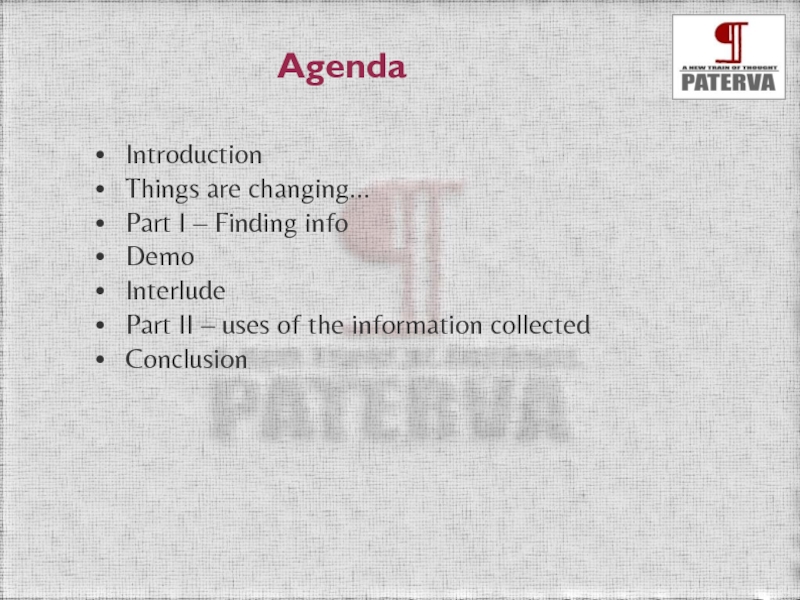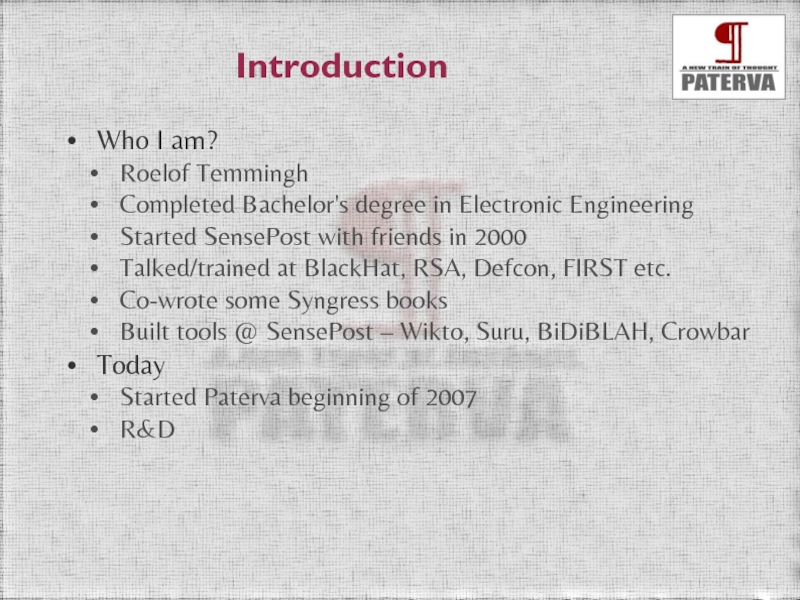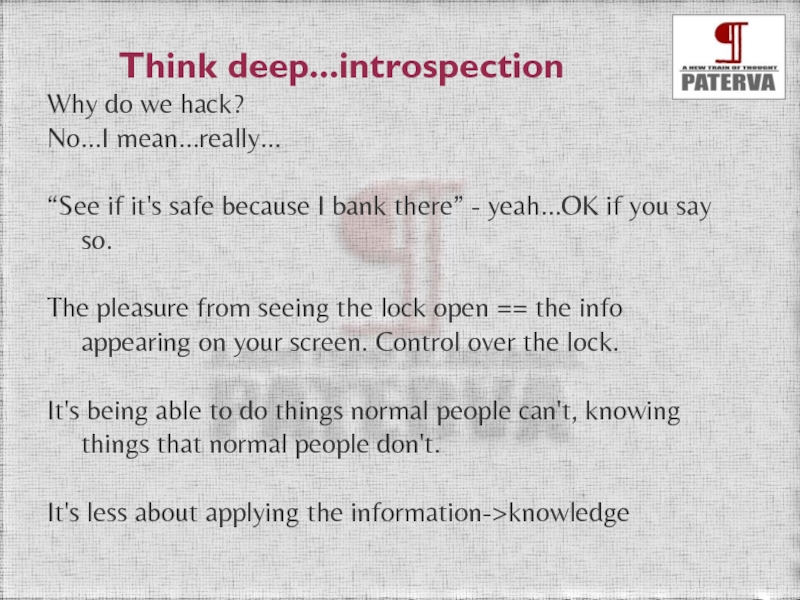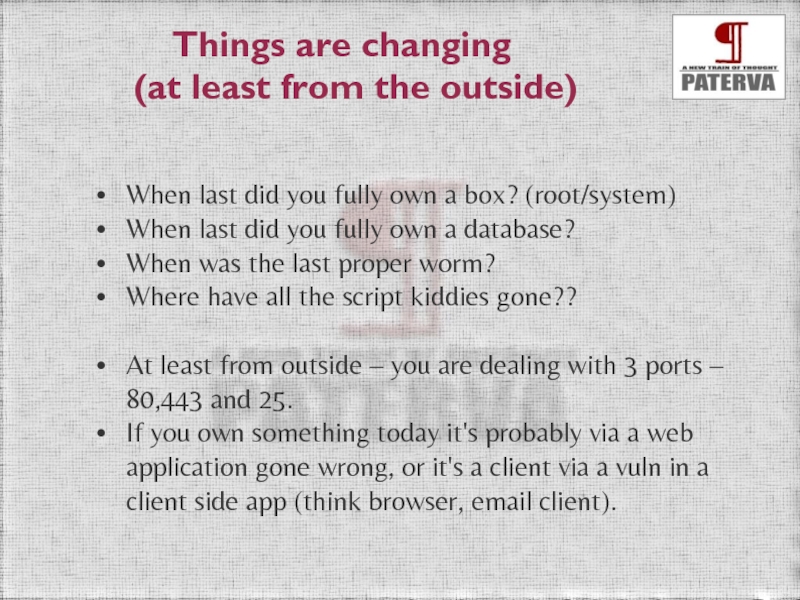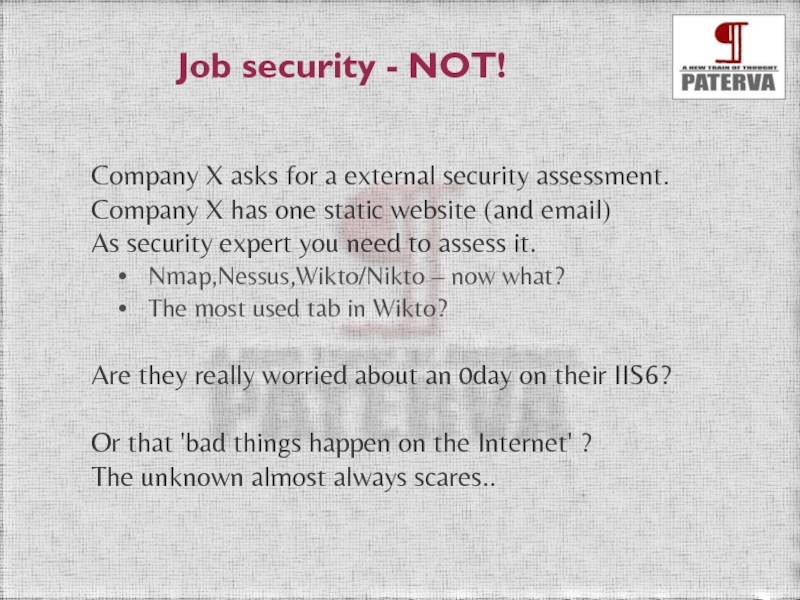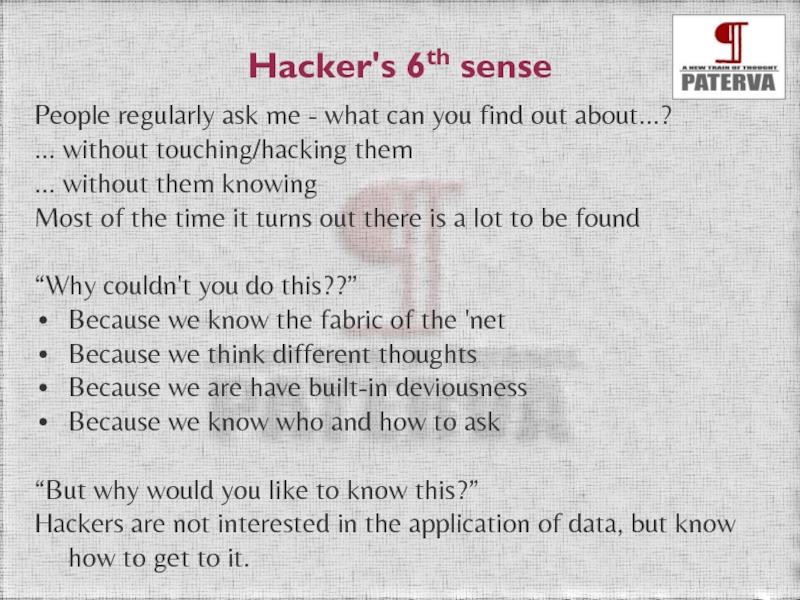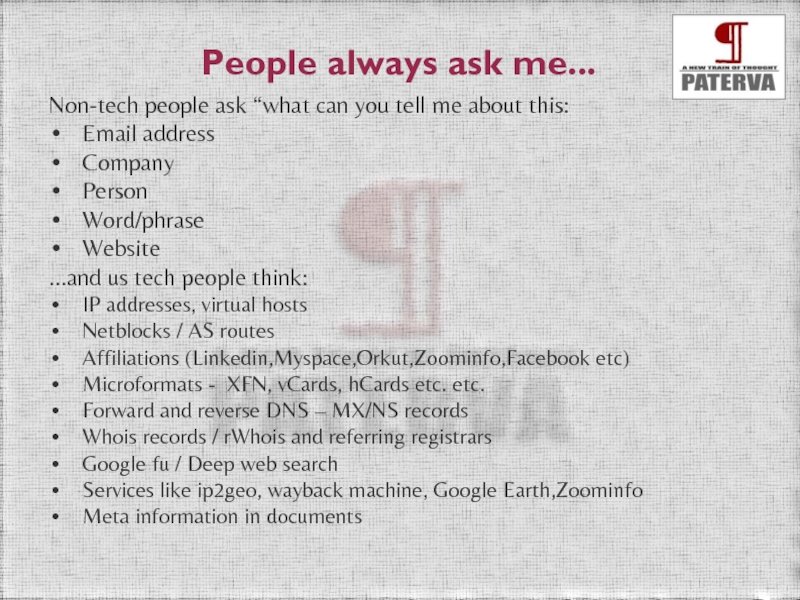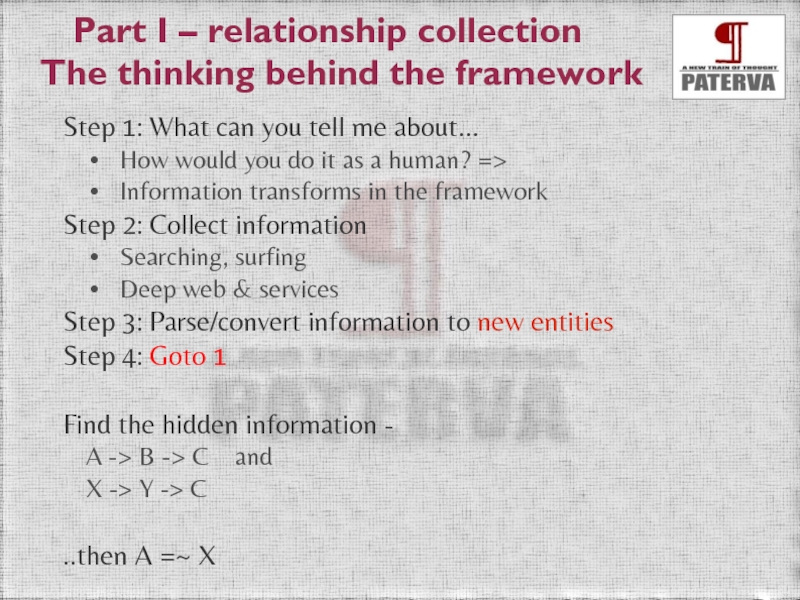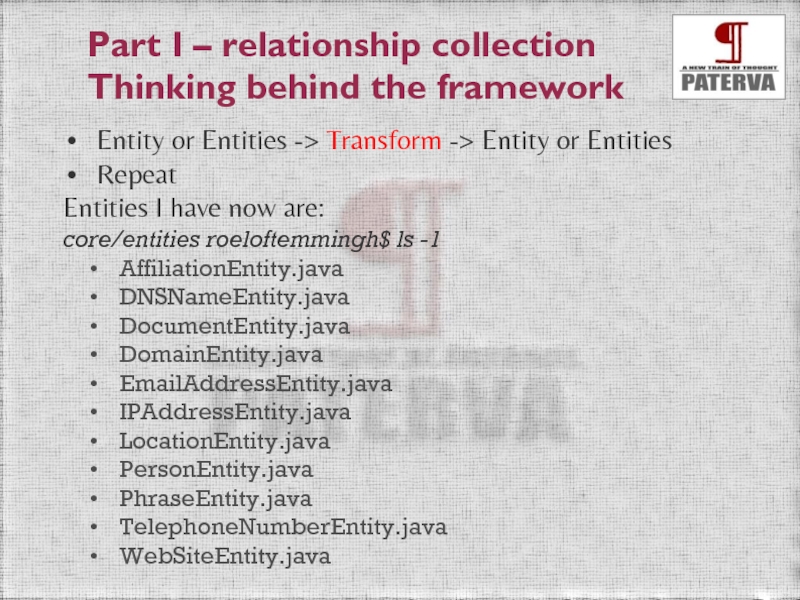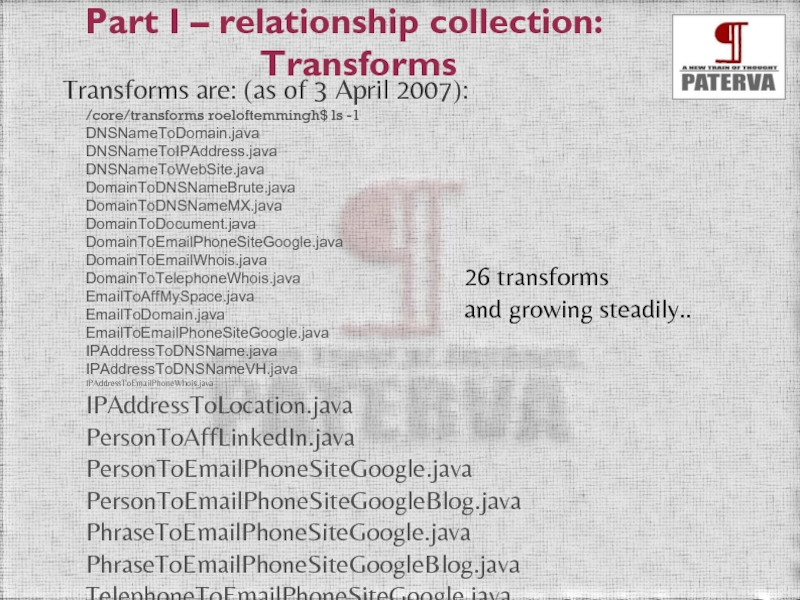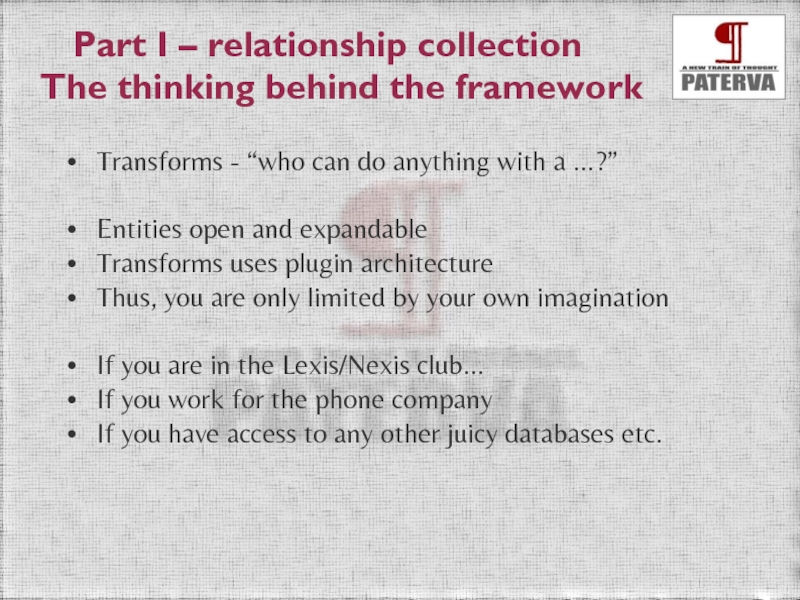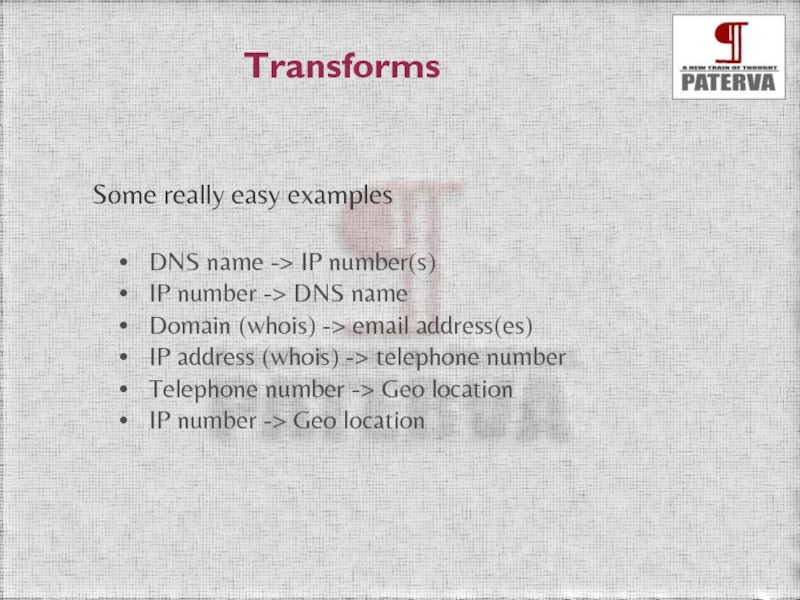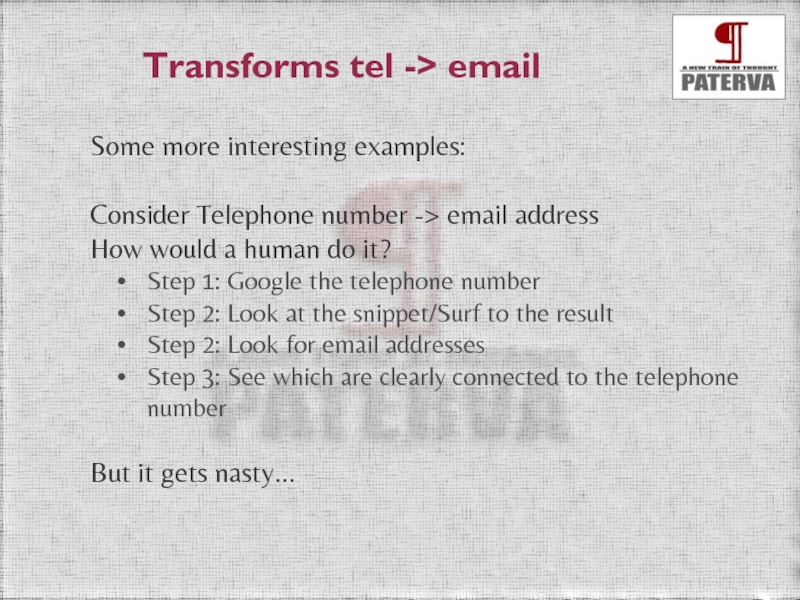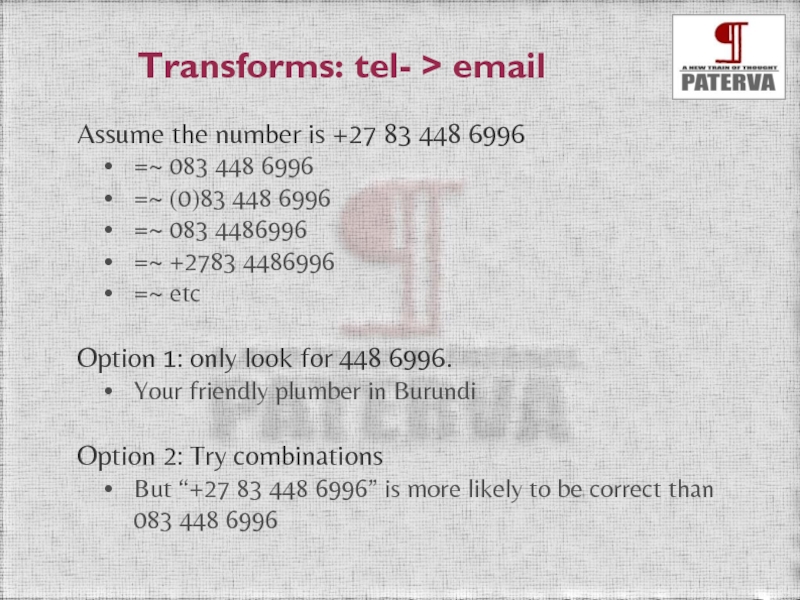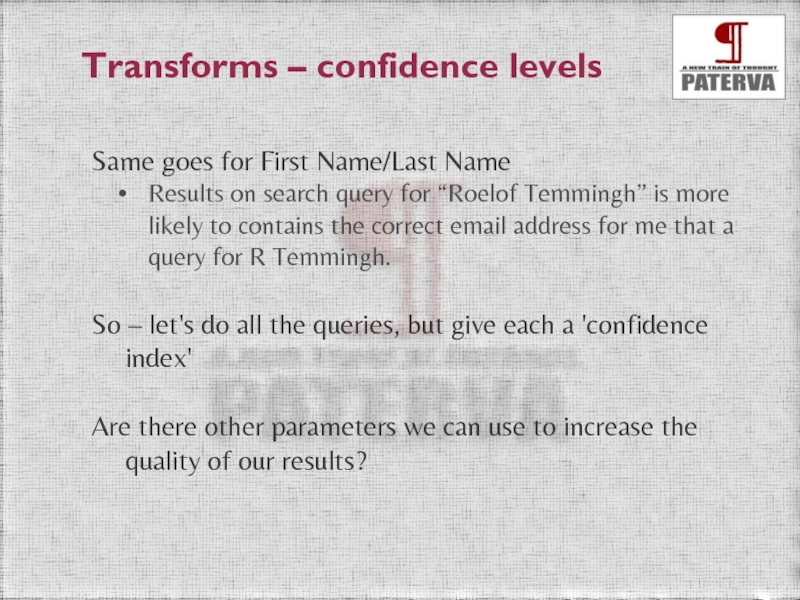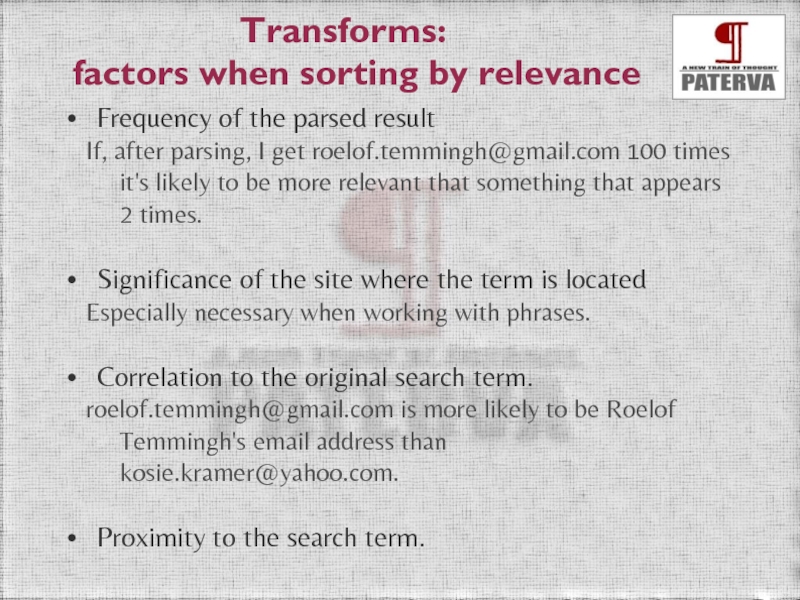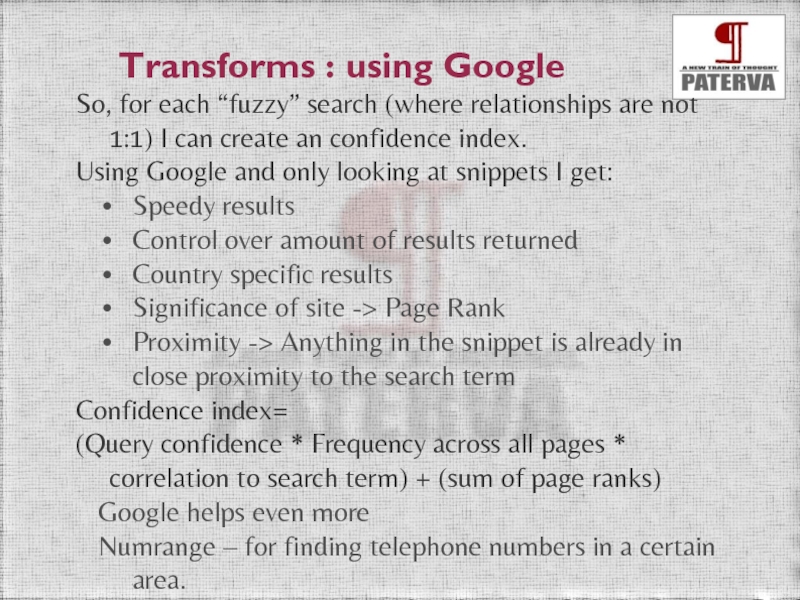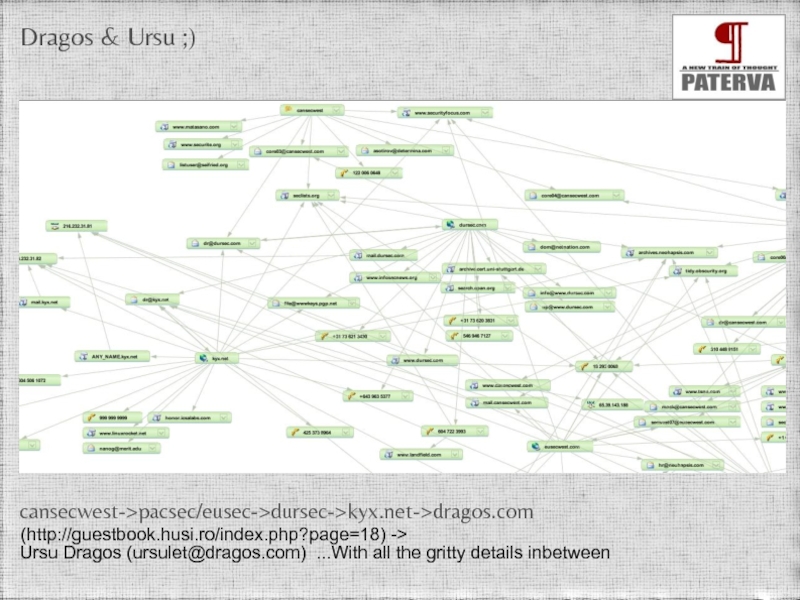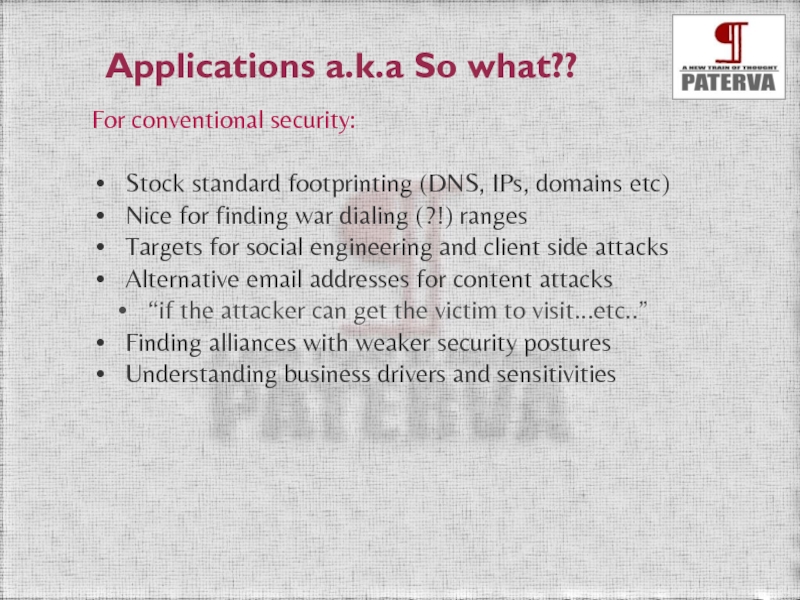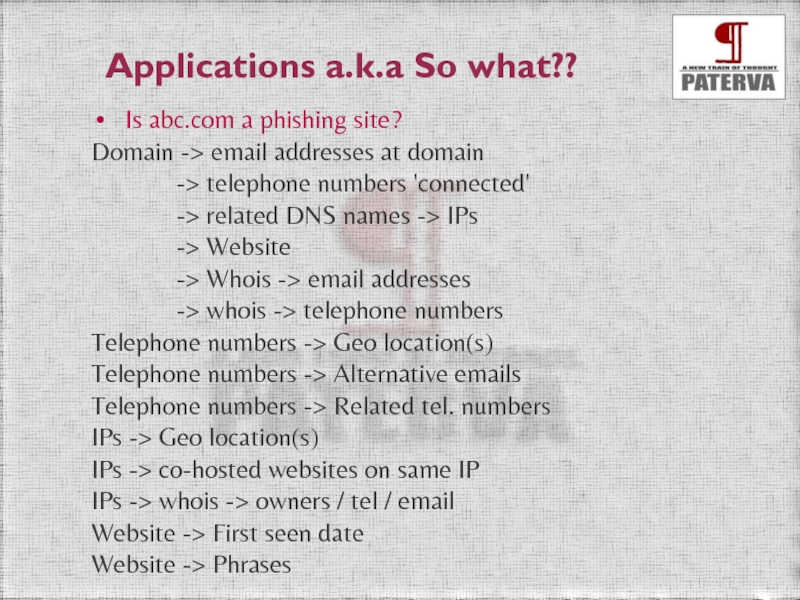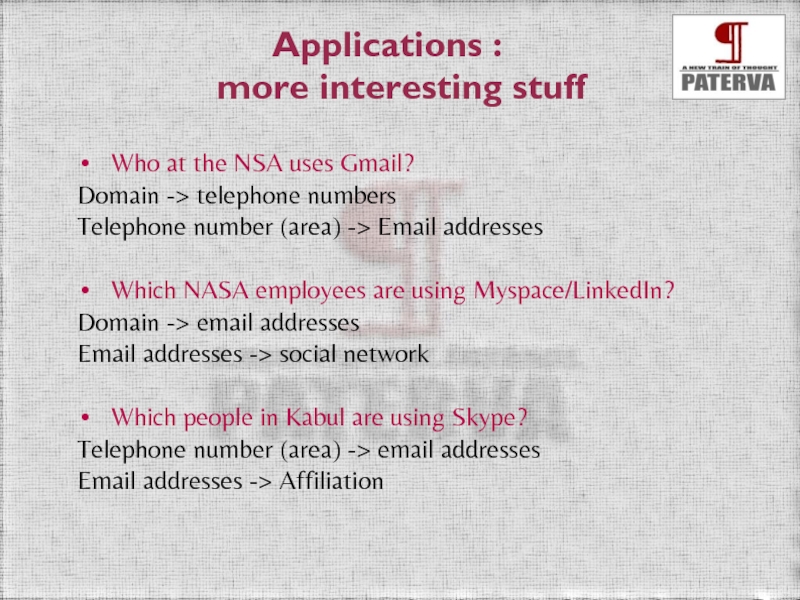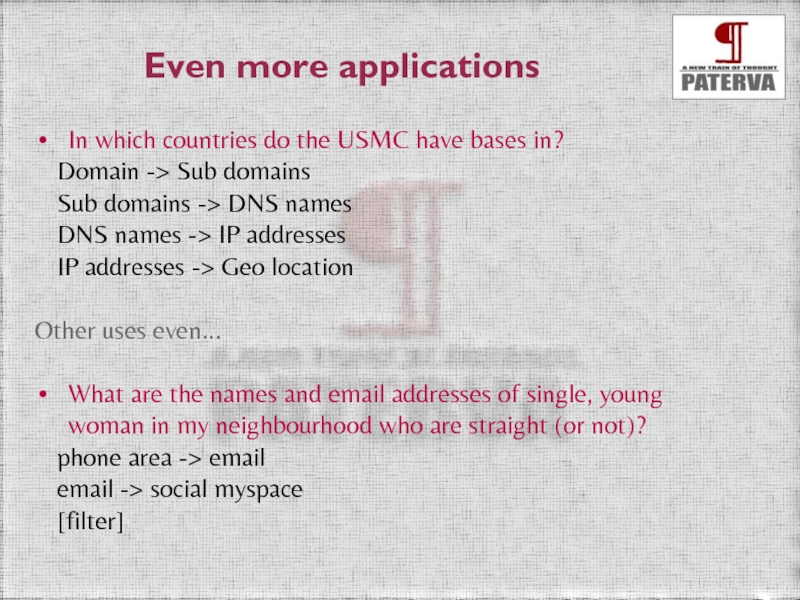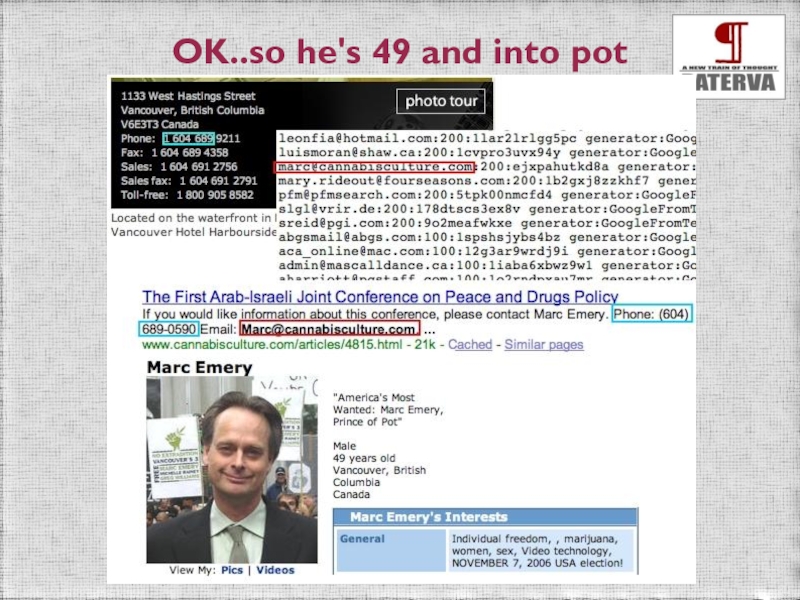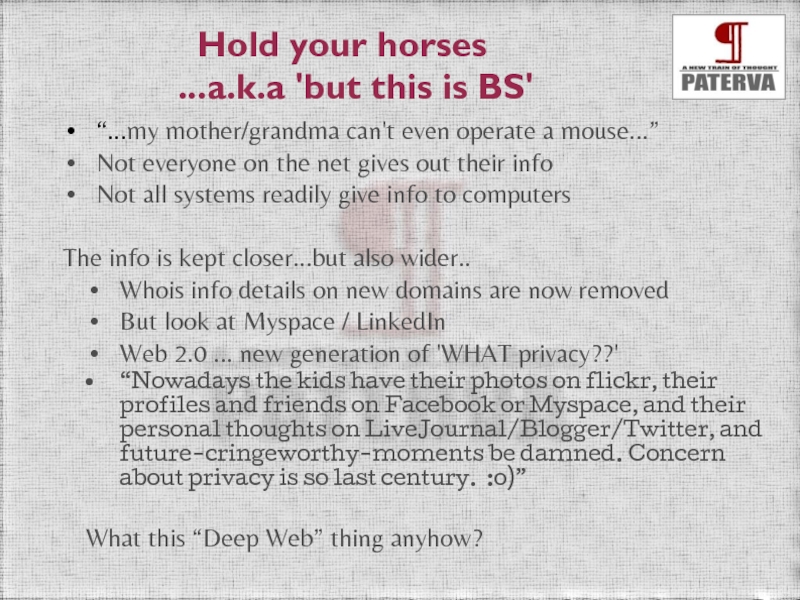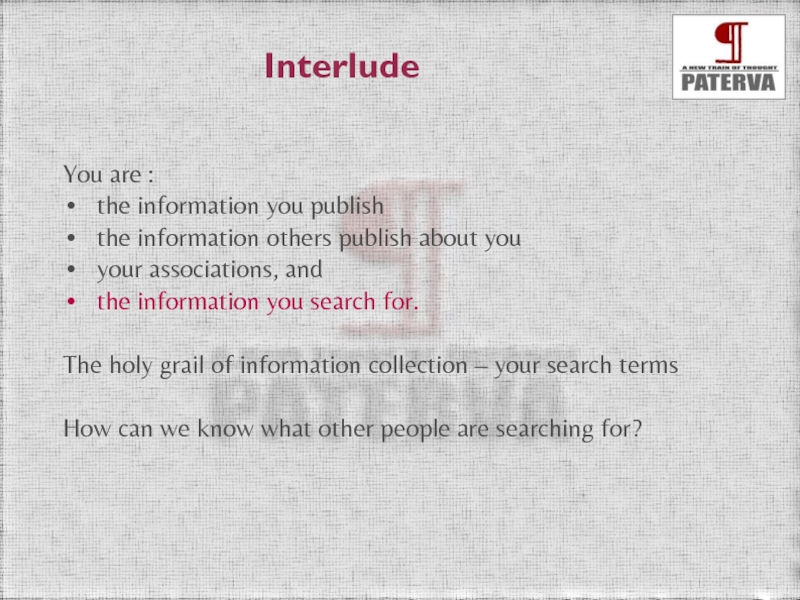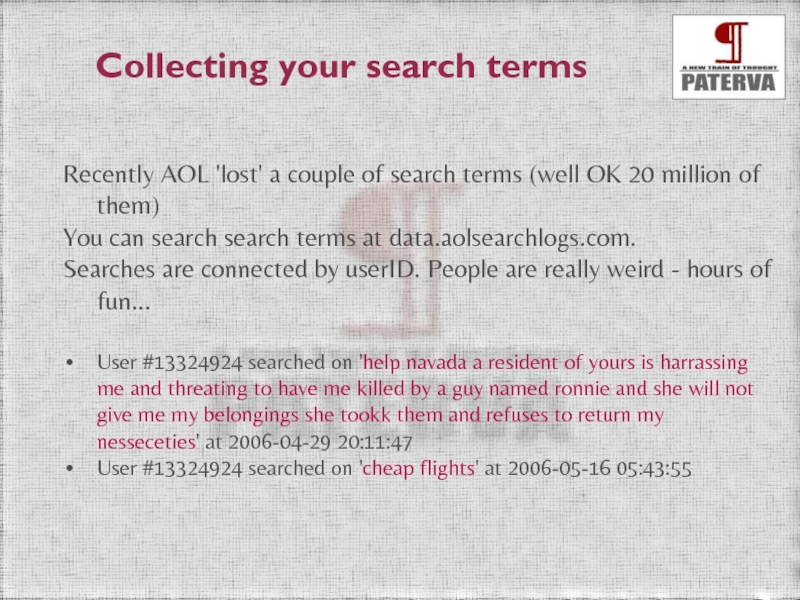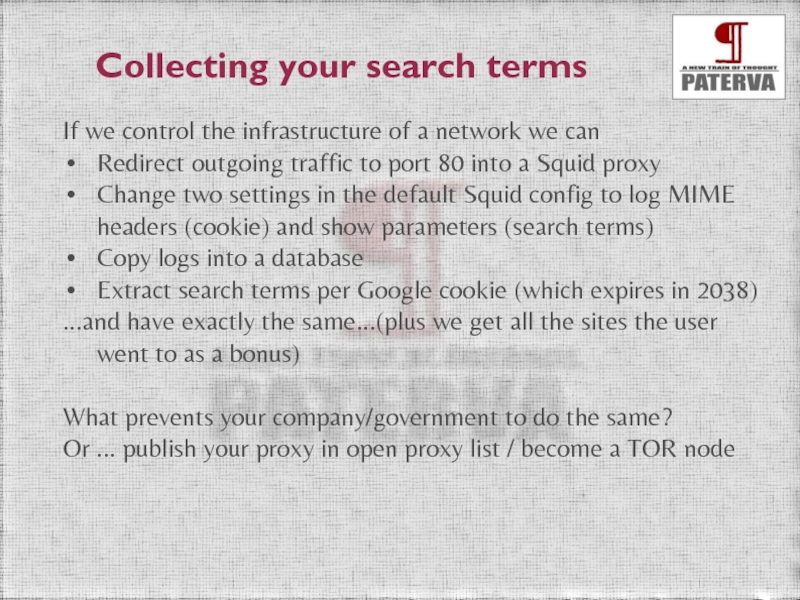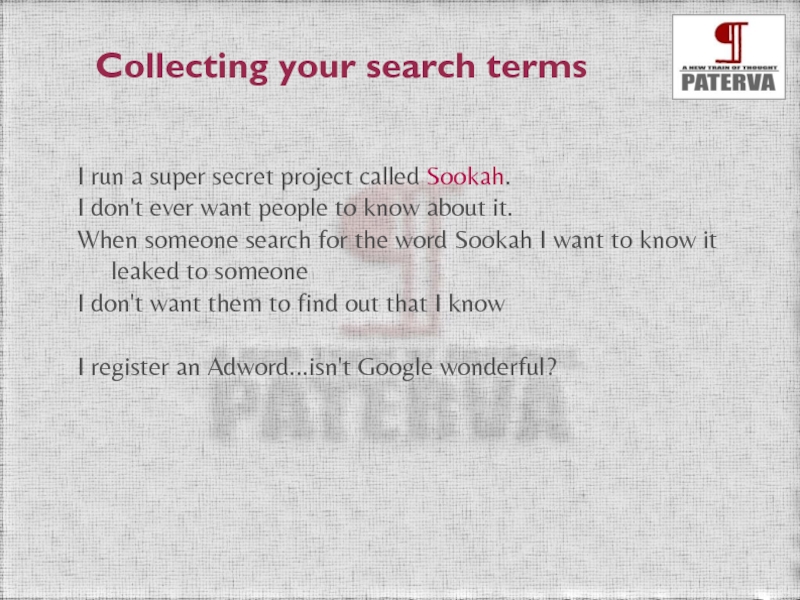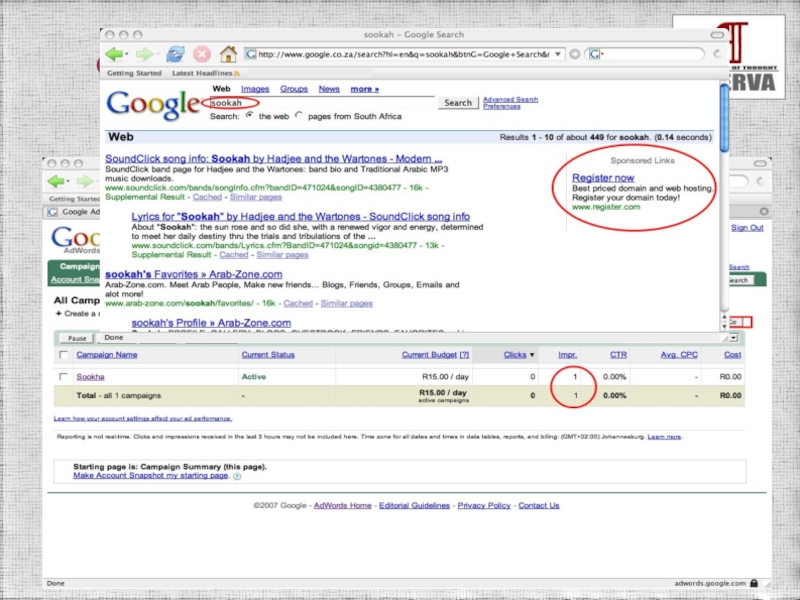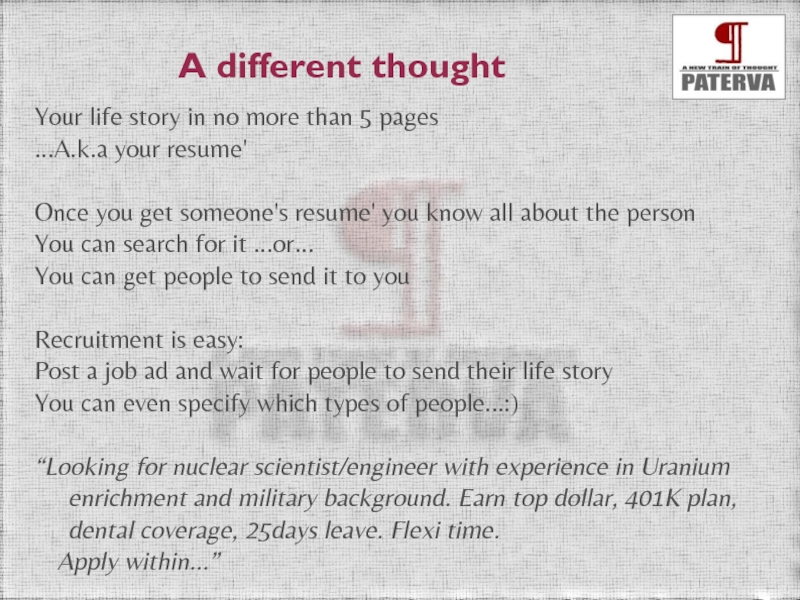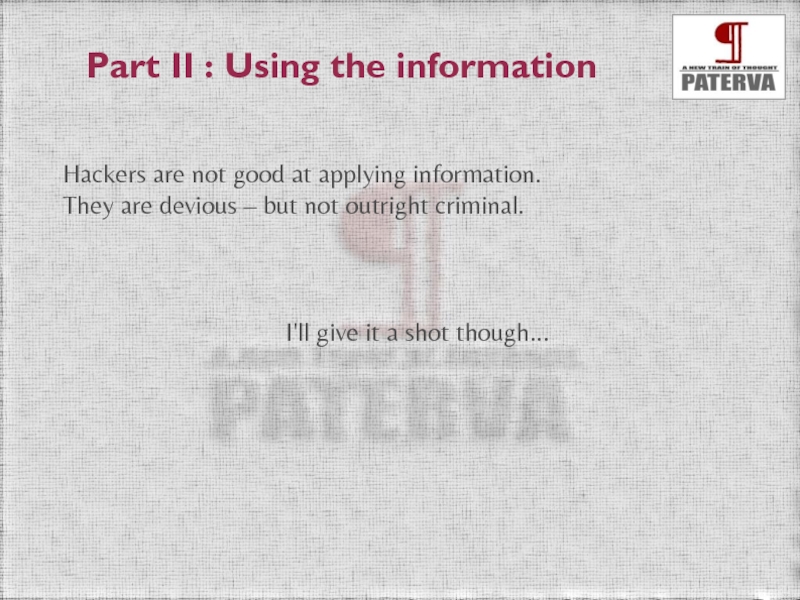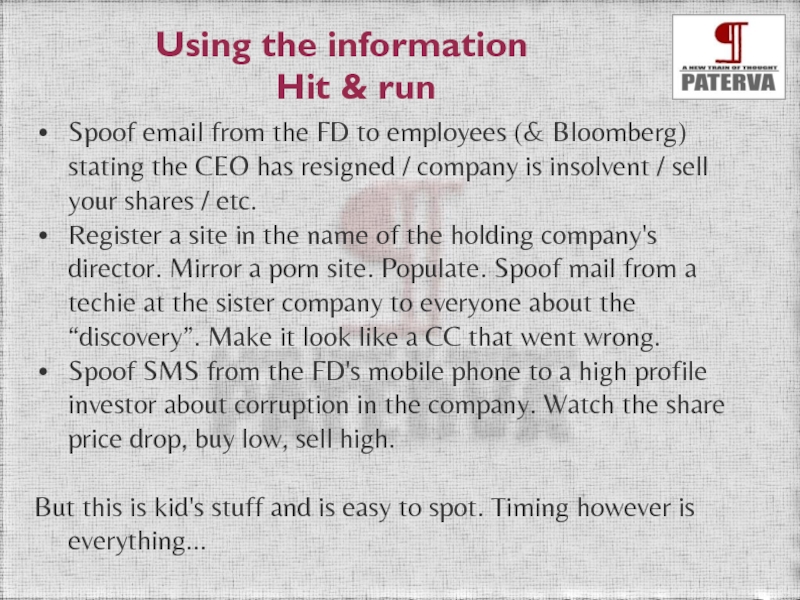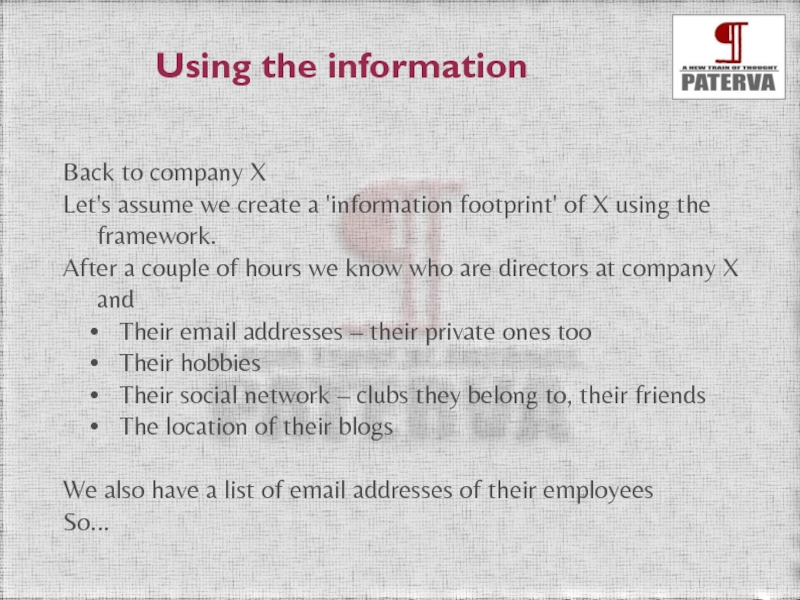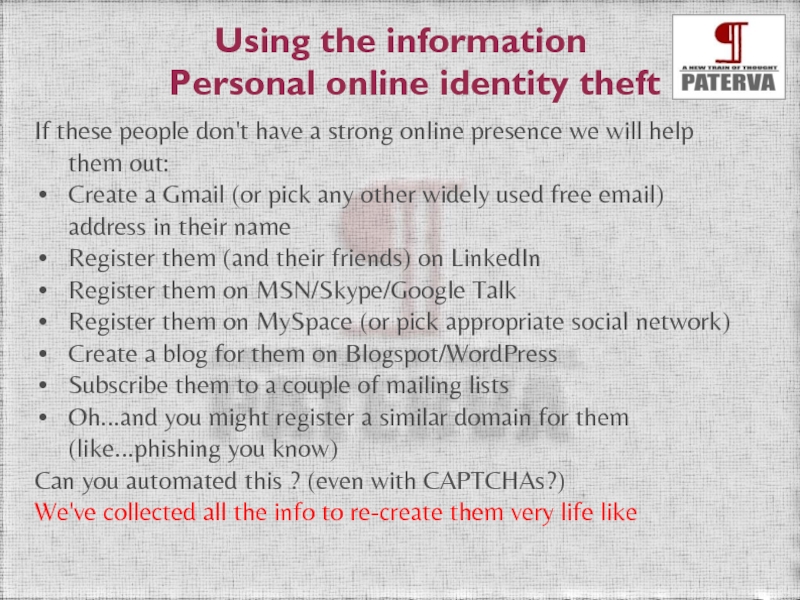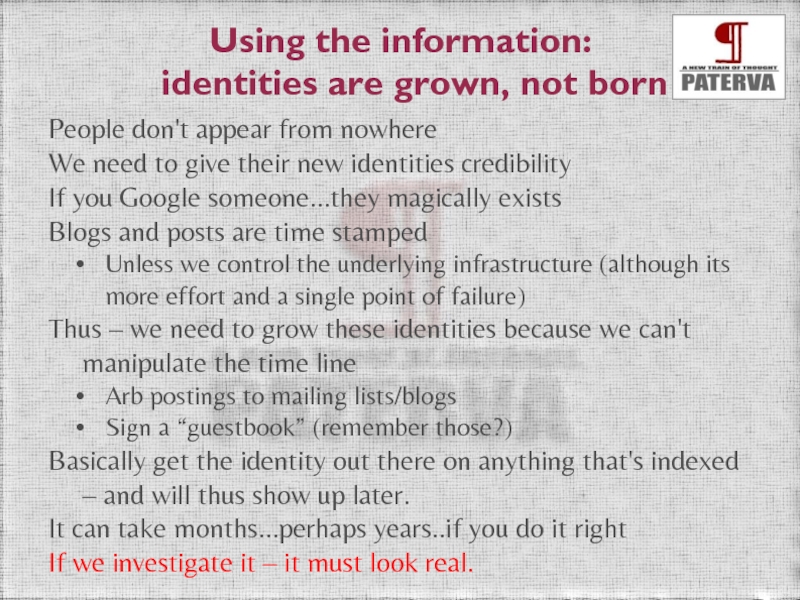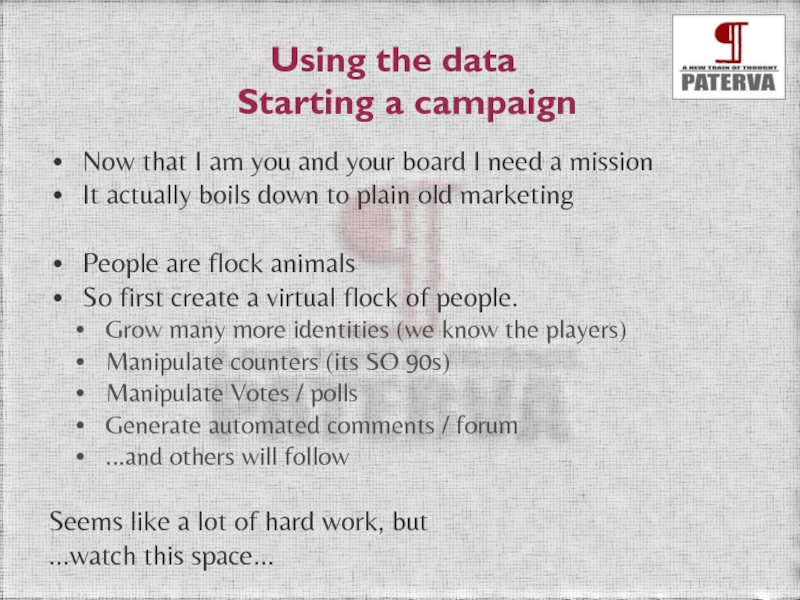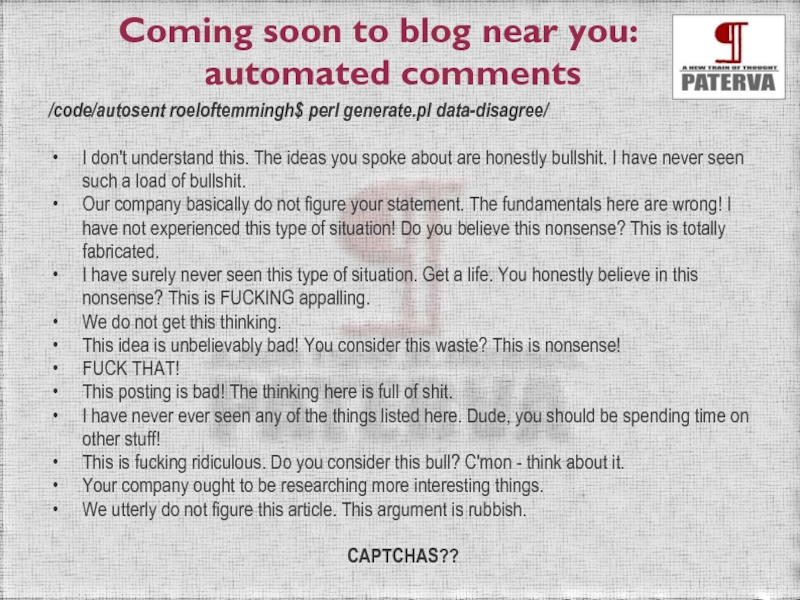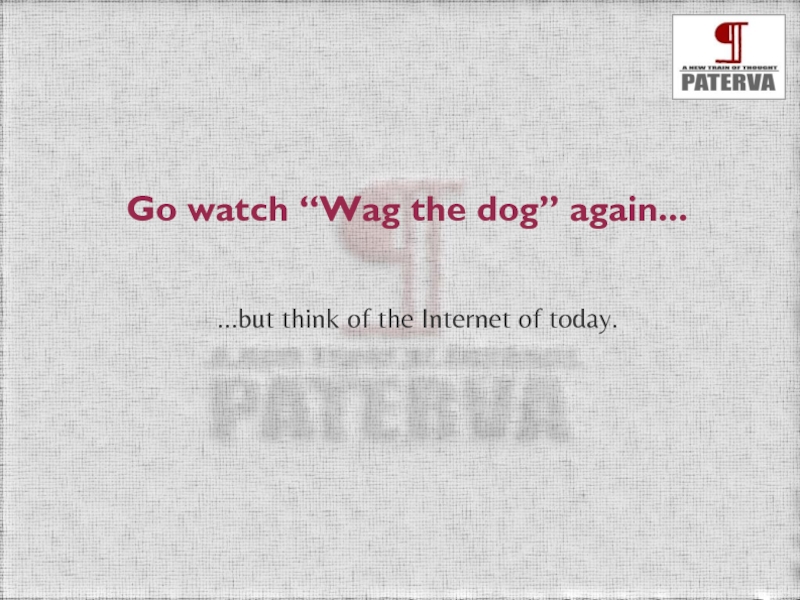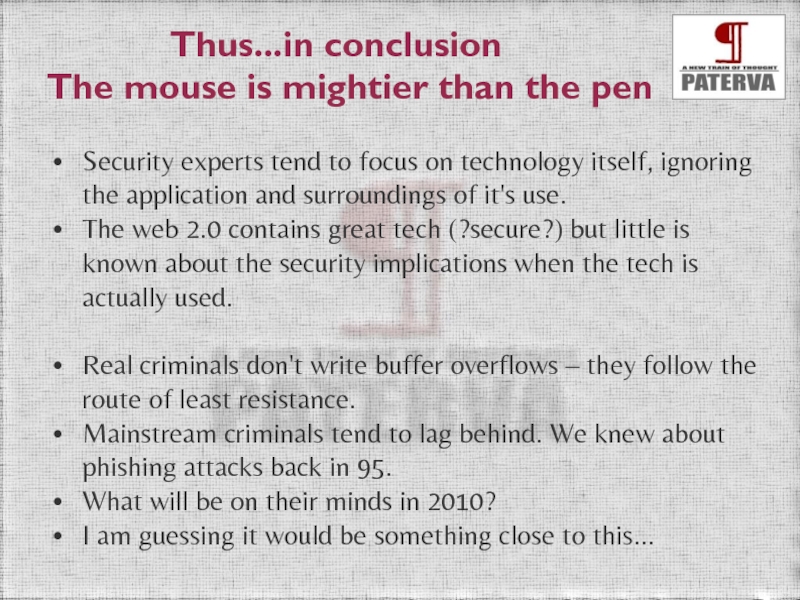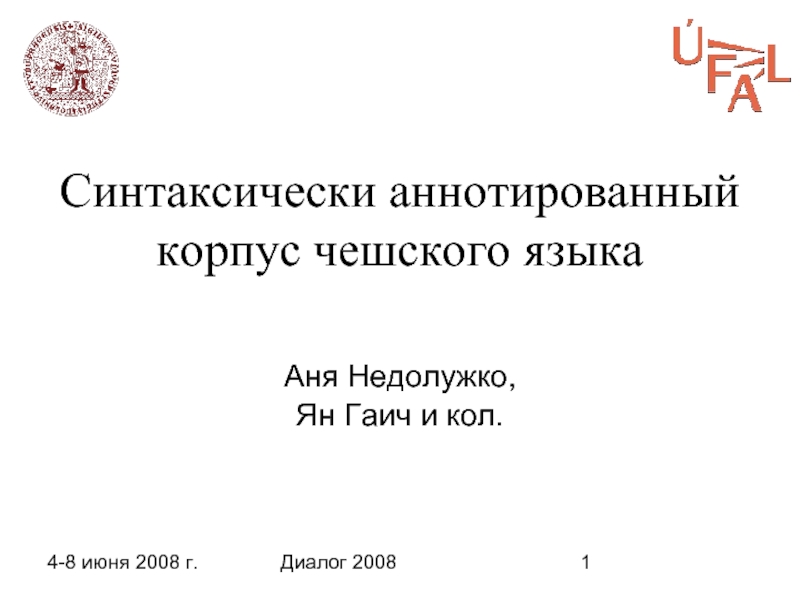the information collected
Conclusion
- Главная
- Разное
- Дизайн
- Бизнес и предпринимательство
- Аналитика
- Образование
- Развлечения
- Красота и здоровье
- Финансы
- Государство
- Путешествия
- Спорт
- Недвижимость
- Армия
- Графика
- Культурология
- Еда и кулинария
- Лингвистика
- Английский язык
- Астрономия
- Алгебра
- Биология
- География
- Детские презентации
- Информатика
- История
- Литература
- Маркетинг
- Математика
- Медицина
- Менеджмент
- Музыка
- МХК
- Немецкий язык
- ОБЖ
- Обществознание
- Окружающий мир
- Педагогика
- Русский язык
- Технология
- Физика
- Философия
- Химия
- Шаблоны, картинки для презентаций
- Экология
- Экономика
- Юриспруденция
Introduction. Things are changing презентация
Содержание
- 2. Agenda Introduction Things are changing... Part I
- 3. Introduction Who I am? Roelof Temmingh Completed
- 4. Think deep...introspection Why do we hack? No...I
- 5. Things are changing (at least from the
- 6. Job security - NOT! Company X asks
- 7. Hacker's 6th sense People regularly ask me
- 8. People always ask me... Non-tech people ask
- 9. Part I – relationship collection The thinking
- 10. Part I – relationship collection Thinking behind
- 11. Part I – relationship collection: Transforms Transforms
- 12. Part I – relationship collection The thinking
- 13. Transforms Some really easy examples DNS
- 14. Transforms tel -> email Some more interesting
- 15. Transforms: tel- > email Assume the number
- 16. Transforms – confidence levels Same goes for
- 17. Transforms: factors when sorting by relevance
- 18. Transforms : using Google So, for each
- 19. Dragos & Ursu ;)
- 20. Applications a.k.a So what?? For conventional security:
- 21. Applications a.k.a So what?? Is abc.com a
- 22. Applications : more interesting stuff Who
- 23. Even more applications In which countries do
- 24. OK..so he's 49 and into pot
- 25. Demo http://www.paterva.com
- 26. Hold your horses ...a.k.a 'but this is
- 27. Interlude You are : the information you
- 28. Collecting your search terms Recently AOL 'lost'
- 29. Collecting your search terms If we control
- 30. Collecting your search terms I run a
- 31. Collecting your search terms
- 32. A different thought Your life story in
- 33. Part II : Using the information Hackers
- 34. Using the information Hit & run Spoof
- 35. Using the information Back to company X
- 36. Using the information Personal online identity theft
- 37. Using the information: identities are grown, not
- 38. Using the data Starting a campaign Now
- 39. Coming soon to blog near you: automated
- 40. Go watch “Wag the dog” again... ...but think of the Internet of today.
- 41. Thus...in conclusion The mouse is mightier than
Слайд 3Introduction
Who I am?
Roelof Temmingh
Completed Bachelor's degree in Electronic Engineering
Started SensePost with
friends in 2000
Talked/trained at BlackHat, RSA, Defcon, FIRST etc.
Co-wrote some Syngress books
Built tools @ SensePost – Wikto, Suru, BiDiBLAH, Crowbar
Today
Started Paterva beginning of 2007
R&D
Talked/trained at BlackHat, RSA, Defcon, FIRST etc.
Co-wrote some Syngress books
Built tools @ SensePost – Wikto, Suru, BiDiBLAH, Crowbar
Today
Started Paterva beginning of 2007
R&D
Слайд 4Think deep...introspection
Why do we hack?
No...I mean...really...
“See if it's safe because I
bank there” - yeah...OK if you say so.
The pleasure from seeing the lock open == the info appearing on your screen. Control over the lock.
It's being able to do things normal people can't, knowing things that normal people don't.
It's less about applying the information->knowledge
The pleasure from seeing the lock open == the info appearing on your screen. Control over the lock.
It's being able to do things normal people can't, knowing things that normal people don't.
It's less about applying the information->knowledge
Слайд 5Things are changing
(at least from the outside)
When last did you fully
own a box? (root/system)
When last did you fully own a database?
When was the last proper worm?
Where have all the script kiddies gone??
At least from outside – you are dealing with 3 ports – 80,443 and 25.
If you own something today it's probably via a web application gone wrong, or it's a client via a vuln in a client side app (think browser, email client).
When last did you fully own a database?
When was the last proper worm?
Where have all the script kiddies gone??
At least from outside – you are dealing with 3 ports – 80,443 and 25.
If you own something today it's probably via a web application gone wrong, or it's a client via a vuln in a client side app (think browser, email client).
Слайд 6Job security - NOT!
Company X asks for a external security assessment.
Company
X has one static website (and email)
As security expert you need to assess it.
Nmap,Nessus,Wikto/Nikto – now what?
The most used tab in Wikto?
Are they really worried about an 0day on their IIS6?
Or that 'bad things happen on the Internet' ?
The unknown almost always scares..
As security expert you need to assess it.
Nmap,Nessus,Wikto/Nikto – now what?
The most used tab in Wikto?
Are they really worried about an 0day on their IIS6?
Or that 'bad things happen on the Internet' ?
The unknown almost always scares..
Слайд 7Hacker's 6th sense
People regularly ask me - what can you find
out about...?
... without touching/hacking them
... without them knowing
Most of the time it turns out there is a lot to be found
“Why couldn't you do this??”
Because we know the fabric of the 'net
Because we think different thoughts
Because we are have built-in deviousness
Because we know who and how to ask
“But why would you like to know this?”
Hackers are not interested in the application of data, but know how to get to it.
... without touching/hacking them
... without them knowing
Most of the time it turns out there is a lot to be found
“Why couldn't you do this??”
Because we know the fabric of the 'net
Because we think different thoughts
Because we are have built-in deviousness
Because we know who and how to ask
“But why would you like to know this?”
Hackers are not interested in the application of data, but know how to get to it.
Слайд 8People always ask me...
Non-tech people ask “what can you tell me
about this:
Email address
Company
Person
Word/phrase
Website
...and us tech people think:
IP addresses, virtual hosts
Netblocks / AS routes
Affiliations (Linkedin,Myspace,Orkut,Zoominfo,Facebook etc)
Microformats - XFN, vCards, hCards etc. etc.
Forward and reverse DNS – MX/NS records
Whois records / rWhois and referring registrars
Google fu / Deep web search
Services like ip2geo, wayback machine, Google Earth,Zoominfo
Meta information in documents
Email address
Company
Person
Word/phrase
Website
...and us tech people think:
IP addresses, virtual hosts
Netblocks / AS routes
Affiliations (Linkedin,Myspace,Orkut,Zoominfo,Facebook etc)
Microformats - XFN, vCards, hCards etc. etc.
Forward and reverse DNS – MX/NS records
Whois records / rWhois and referring registrars
Google fu / Deep web search
Services like ip2geo, wayback machine, Google Earth,Zoominfo
Meta information in documents
Слайд 9Part I – relationship collection
The thinking behind the framework
Step 1: What
can you tell me about...
How would you do it as a human? =>
Information transforms in the framework
Step 2: Collect information
Searching, surfing
Deep web & services
Step 3: Parse/convert information to new entities
Step 4: Goto 1
Find the hidden information -
A -> B -> C and
X -> Y -> C
..then A =~ X
How would you do it as a human? =>
Information transforms in the framework
Step 2: Collect information
Searching, surfing
Deep web & services
Step 3: Parse/convert information to new entities
Step 4: Goto 1
Find the hidden information -
A -> B -> C and
X -> Y -> C
..then A =~ X
Слайд 10Part I – relationship collection
Thinking behind the framework
Entity or Entities ->
Transform -> Entity or Entities
Repeat
Entities I have now are:
core/entities roeloftemmingh$ ls -1
AffiliationEntity.java
DNSNameEntity.java
DocumentEntity.java
DomainEntity.java
EmailAddressEntity.java
IPAddressEntity.java
LocationEntity.java
PersonEntity.java
PhraseEntity.java
TelephoneNumberEntity.java
WebSiteEntity.java
Repeat
Entities I have now are:
core/entities roeloftemmingh$ ls -1
AffiliationEntity.java
DNSNameEntity.java
DocumentEntity.java
DomainEntity.java
EmailAddressEntity.java
IPAddressEntity.java
LocationEntity.java
PersonEntity.java
PhraseEntity.java
TelephoneNumberEntity.java
WebSiteEntity.java
Слайд 11Part I – relationship collection: Transforms
Transforms are: (as of 3 April
2007):
/core/transforms roeloftemmingh$ ls -1
DNSNameToDomain.java
DNSNameToIPAddress.java
DNSNameToWebSite.java
DomainToDNSNameBrute.java
DomainToDNSNameMX.java
DomainToDocument.java
DomainToEmailPhoneSiteGoogle.java
DomainToEmailWhois.java
DomainToTelephoneWhois.java
EmailToAffMySpace.java
EmailToDomain.java
EmailToEmailPhoneSiteGoogle.java
IPAddressToDNSName.java
IPAddressToDNSNameVH.java
IPAddressToEmailPhoneWhois.java
IPAddressToLocation.java
PersonToAffLinkedIn.java
PersonToEmailPhoneSiteGoogle.java
PersonToEmailPhoneSiteGoogleBlog.java
PhraseToEmailPhoneSiteGoogle.java
PhraseToEmailPhoneSiteGoogleBlog.java
TelephoneToEmailPhoneSiteGoogle.java
WebSiteToDNSName.java
WebSiteToWebSiteIncomingLink.java
_WebSiteGetFirstSeen.java
_WebSiteGetServerVersion.java
/core/transforms roeloftemmingh$ ls -1
DNSNameToDomain.java
DNSNameToIPAddress.java
DNSNameToWebSite.java
DomainToDNSNameBrute.java
DomainToDNSNameMX.java
DomainToDocument.java
DomainToEmailPhoneSiteGoogle.java
DomainToEmailWhois.java
DomainToTelephoneWhois.java
EmailToAffMySpace.java
EmailToDomain.java
EmailToEmailPhoneSiteGoogle.java
IPAddressToDNSName.java
IPAddressToDNSNameVH.java
IPAddressToEmailPhoneWhois.java
IPAddressToLocation.java
PersonToAffLinkedIn.java
PersonToEmailPhoneSiteGoogle.java
PersonToEmailPhoneSiteGoogleBlog.java
PhraseToEmailPhoneSiteGoogle.java
PhraseToEmailPhoneSiteGoogleBlog.java
TelephoneToEmailPhoneSiteGoogle.java
WebSiteToDNSName.java
WebSiteToWebSiteIncomingLink.java
_WebSiteGetFirstSeen.java
_WebSiteGetServerVersion.java
26 transforms
and growing steadily..
Слайд 12Part I – relationship collection
The thinking behind the framework
Transforms - “who
can do anything with a ...?”
Entities open and expandable
Transforms uses plugin architecture
Thus, you are only limited by your own imagination
If you are in the Lexis/Nexis club...
If you work for the phone company
If you have access to any other juicy databases etc.
Entities open and expandable
Transforms uses plugin architecture
Thus, you are only limited by your own imagination
If you are in the Lexis/Nexis club...
If you work for the phone company
If you have access to any other juicy databases etc.
Слайд 13Transforms
Some really easy examples
DNS name -> IP number(s)
IP number -> DNS
name
Domain (whois) -> email address(es)
IP address (whois) -> telephone number
Telephone number -> Geo location
IP number -> Geo location
Domain (whois) -> email address(es)
IP address (whois) -> telephone number
Telephone number -> Geo location
IP number -> Geo location
Слайд 14Transforms tel -> email
Some more interesting examples:
Consider Telephone number -> email
address
How would a human do it?
Step 1: Google the telephone number
Step 2: Look at the snippet/Surf to the result
Step 2: Look for email addresses
Step 3: See which are clearly connected to the telephone number
But it gets nasty...
How would a human do it?
Step 1: Google the telephone number
Step 2: Look at the snippet/Surf to the result
Step 2: Look for email addresses
Step 3: See which are clearly connected to the telephone number
But it gets nasty...
Слайд 15Transforms: tel- > email
Assume the number is +27 83 448 6996
=~
083 448 6996
=~ (0)83 448 6996
=~ 083 4486996
=~ +2783 4486996
=~ etc
Option 1: only look for 448 6996.
Your friendly plumber in Burundi
Option 2: Try combinations
But “+27 83 448 6996” is more likely to be correct than 083 448 6996
=~ (0)83 448 6996
=~ 083 4486996
=~ +2783 4486996
=~ etc
Option 1: only look for 448 6996.
Your friendly plumber in Burundi
Option 2: Try combinations
But “+27 83 448 6996” is more likely to be correct than 083 448 6996
Слайд 16Transforms – confidence levels
Same goes for First Name/Last Name
Results on search
query for “Roelof Temmingh” is more likely to contains the correct email address for me that a query for R Temmingh.
So – let's do all the queries, but give each a 'confidence index'
Are there other parameters we can use to increase the quality of our results?
So – let's do all the queries, but give each a 'confidence index'
Are there other parameters we can use to increase the quality of our results?
Слайд 17Transforms:
factors when sorting by relevance
Frequency of the parsed result
If, after
parsing, I get roelof.temmingh@gmail.com 100 times it's likely to be more relevant that something that appears 2 times.
Significance of the site where the term is located
Especially necessary when working with phrases.
Correlation to the original search term.
roelof.temmingh@gmail.com is more likely to be Roelof Temmingh's email address than kosie.kramer@yahoo.com.
Proximity to the search term.
Significance of the site where the term is located
Especially necessary when working with phrases.
Correlation to the original search term.
roelof.temmingh@gmail.com is more likely to be Roelof Temmingh's email address than kosie.kramer@yahoo.com.
Proximity to the search term.
Слайд 18Transforms : using Google
So, for each “fuzzy” search (where relationships are
not 1:1) I can create an confidence index.
Using Google and only looking at snippets I get:
Speedy results
Control over amount of results returned
Country specific results
Significance of site -> Page Rank
Proximity -> Anything in the snippet is already in close proximity to the search term
Confidence index=
(Query confidence * Frequency across all pages * correlation to search term) + (sum of page ranks)
Google helps even more
Numrange – for finding telephone numbers in a certain area.
Using Google and only looking at snippets I get:
Speedy results
Control over amount of results returned
Country specific results
Significance of site -> Page Rank
Proximity -> Anything in the snippet is already in close proximity to the search term
Confidence index=
(Query confidence * Frequency across all pages * correlation to search term) + (sum of page ranks)
Google helps even more
Numrange – for finding telephone numbers in a certain area.
Слайд 19Dragos & Ursu ;)
cansecwest->pacsec/eusec->dursec->kyx.net->dragos.com
(http://guestbook.husi.ro/index.php?page=18) ->
Ursu Dragos (ursulet@dragos.com) ...With all
the gritty details inbetween
Слайд 20Applications a.k.a So what??
For conventional security:
Stock standard footprinting (DNS, IPs, domains
etc)
Nice for finding war dialing (?!) ranges
Targets for social engineering and client side attacks
Alternative email addresses for content attacks
“if the attacker can get the victim to visit...etc..”
Finding alliances with weaker security postures
Understanding business drivers and sensitivities
Nice for finding war dialing (?!) ranges
Targets for social engineering and client side attacks
Alternative email addresses for content attacks
“if the attacker can get the victim to visit...etc..”
Finding alliances with weaker security postures
Understanding business drivers and sensitivities
Слайд 21Applications a.k.a So what??
Is abc.com a phishing site?
Domain -> email addresses
at domain
-> telephone numbers 'connected'
-> related DNS names -> IPs
-> Website
-> Whois -> email addresses
-> whois -> telephone numbers
Telephone numbers -> Geo location(s)
Telephone numbers -> Alternative emails
Telephone numbers -> Related tel. numbers
IPs -> Geo location(s)
IPs -> co-hosted websites on same IP
IPs -> whois -> owners / tel / email
Website -> First seen date
Website -> Phrases
-> telephone numbers 'connected'
-> related DNS names -> IPs
-> Website
-> Whois -> email addresses
-> whois -> telephone numbers
Telephone numbers -> Geo location(s)
Telephone numbers -> Alternative emails
Telephone numbers -> Related tel. numbers
IPs -> Geo location(s)
IPs -> co-hosted websites on same IP
IPs -> whois -> owners / tel / email
Website -> First seen date
Website -> Phrases
Слайд 22Applications :
more interesting stuff
Who at the NSA uses Gmail?
Domain ->
telephone numbers
Telephone number (area) -> Email addresses
Which NASA employees are using Myspace/LinkedIn?
Domain -> email addresses
Email addresses -> social network
Which people in Kabul are using Skype?
Telephone number (area) -> email addresses
Email addresses -> Affiliation
Telephone number (area) -> Email addresses
Which NASA employees are using Myspace/LinkedIn?
Domain -> email addresses
Email addresses -> social network
Which people in Kabul are using Skype?
Telephone number (area) -> email addresses
Email addresses -> Affiliation
Слайд 23Even more applications
In which countries do the USMC have bases in?
Domain
-> Sub domains
Sub domains -> DNS names
DNS names -> IP addresses
IP addresses -> Geo location
Other uses even...
What are the names and email addresses of single, young woman in my neighbourhood who are straight (or not)?
phone area -> email
email -> social myspace
[filter]
Sub domains -> DNS names
DNS names -> IP addresses
IP addresses -> Geo location
Other uses even...
What are the names and email addresses of single, young woman in my neighbourhood who are straight (or not)?
phone area -> email
email -> social myspace
[filter]
Слайд 26Hold your horses
...a.k.a 'but this is BS'
“...my mother/grandma can't even operate
a mouse...”
Not everyone on the net gives out their info
Not all systems readily give info to computers
The info is kept closer...but also wider..
Whois info details on new domains are now removed
But look at Myspace / LinkedIn
Web 2.0 ... new generation of 'WHAT privacy??'
“Nowadays the kids have their photos on flickr, their profiles and friends on Facebook or Myspace, and their personal thoughts on LiveJournal/Blogger/Twitter, and future-cringeworthy-moments be damned. Concern about privacy is so last century. :o)”
What this “Deep Web” thing anyhow?
Not everyone on the net gives out their info
Not all systems readily give info to computers
The info is kept closer...but also wider..
Whois info details on new domains are now removed
But look at Myspace / LinkedIn
Web 2.0 ... new generation of 'WHAT privacy??'
“Nowadays the kids have their photos on flickr, their profiles and friends on Facebook or Myspace, and their personal thoughts on LiveJournal/Blogger/Twitter, and future-cringeworthy-moments be damned. Concern about privacy is so last century. :o)”
What this “Deep Web” thing anyhow?
Слайд 27Interlude
You are :
the information you publish
the information others publish about you
your
associations, and
the information you search for.
The holy grail of information collection – your search terms
How can we know what other people are searching for?
the information you search for.
The holy grail of information collection – your search terms
How can we know what other people are searching for?
Слайд 28Collecting your search terms
Recently AOL 'lost' a couple of search terms
(well OK 20 million of them)
You can search search terms at data.aolsearchlogs.com.
Searches are connected by userID. People are really weird - hours of fun...
User #13324924 searched on 'help navada a resident of yours is harrassing me and threating to have me killed by a guy named ronnie and she will not give me my belongings she tookk them and refuses to return my nesseceties' at 2006-04-29 20:11:47
User #13324924 searched on 'cheap flights' at 2006-05-16 05:43:55
You can search search terms at data.aolsearchlogs.com.
Searches are connected by userID. People are really weird - hours of fun...
User #13324924 searched on 'help navada a resident of yours is harrassing me and threating to have me killed by a guy named ronnie and she will not give me my belongings she tookk them and refuses to return my nesseceties' at 2006-04-29 20:11:47
User #13324924 searched on 'cheap flights' at 2006-05-16 05:43:55
Слайд 29Collecting your search terms
If we control the infrastructure of a network
we can
Redirect outgoing traffic to port 80 into a Squid proxy
Change two settings in the default Squid config to log MIME headers (cookie) and show parameters (search terms)
Copy logs into a database
Extract search terms per Google cookie (which expires in 2038)
...and have exactly the same...(plus we get all the sites the user went to as a bonus)
What prevents your company/government to do the same?
Or ... publish your proxy in open proxy list / become a TOR node
Redirect outgoing traffic to port 80 into a Squid proxy
Change two settings in the default Squid config to log MIME headers (cookie) and show parameters (search terms)
Copy logs into a database
Extract search terms per Google cookie (which expires in 2038)
...and have exactly the same...(plus we get all the sites the user went to as a bonus)
What prevents your company/government to do the same?
Or ... publish your proxy in open proxy list / become a TOR node
Слайд 30Collecting your search terms
I run a super secret project called Sookah.
I
don't ever want people to know about it.
When someone search for the word Sookah I want to know it leaked to someone
I don't want them to find out that I know
I register an Adword...isn't Google wonderful?
When someone search for the word Sookah I want to know it leaked to someone
I don't want them to find out that I know
I register an Adword...isn't Google wonderful?
Слайд 32A different thought
Your life story in no more than 5 pages
...A.k.a
your resume'
Once you get someone's resume' you know all about the person
You can search for it ...or...
You can get people to send it to you
Recruitment is easy:
Post a job ad and wait for people to send their life story
You can even specify which types of people...:)
“Looking for nuclear scientist/engineer with experience in Uranium enrichment and military background. Earn top dollar, 401K plan, dental coverage, 25days leave. Flexi time.
Apply within...”
Once you get someone's resume' you know all about the person
You can search for it ...or...
You can get people to send it to you
Recruitment is easy:
Post a job ad and wait for people to send their life story
You can even specify which types of people...:)
“Looking for nuclear scientist/engineer with experience in Uranium enrichment and military background. Earn top dollar, 401K plan, dental coverage, 25days leave. Flexi time.
Apply within...”
Слайд 33Part II : Using the information
Hackers are not good at applying
information.
They are devious – but not outright criminal.
I'll give it a shot though...
They are devious – but not outright criminal.
I'll give it a shot though...
Слайд 34Using the information
Hit & run
Spoof email from the FD to employees
(& Bloomberg) stating the CEO has resigned / company is insolvent / sell your shares / etc.
Register a site in the name of the holding company's director. Mirror a porn site. Populate. Spoof mail from a techie at the sister company to everyone about the “discovery”. Make it look like a CC that went wrong.
Spoof SMS from the FD's mobile phone to a high profile investor about corruption in the company. Watch the share price drop, buy low, sell high.
But this is kid's stuff and is easy to spot. Timing however is everything...
Register a site in the name of the holding company's director. Mirror a porn site. Populate. Spoof mail from a techie at the sister company to everyone about the “discovery”. Make it look like a CC that went wrong.
Spoof SMS from the FD's mobile phone to a high profile investor about corruption in the company. Watch the share price drop, buy low, sell high.
But this is kid's stuff and is easy to spot. Timing however is everything...
Слайд 35Using the information
Back to company X
Let's assume we create a 'information
footprint' of X using the framework.
After a couple of hours we know who are directors at company X and
Their email addresses – their private ones too
Their hobbies
Their social network – clubs they belong to, their friends
The location of their blogs
We also have a list of email addresses of their employees
So...
After a couple of hours we know who are directors at company X and
Their email addresses – their private ones too
Their hobbies
Their social network – clubs they belong to, their friends
The location of their blogs
We also have a list of email addresses of their employees
So...
Слайд 36Using the information
Personal online identity theft
If these people don't have a
strong online presence we will help them out:
Create a Gmail (or pick any other widely used free email) address in their name
Register them (and their friends) on LinkedIn
Register them on MSN/Skype/Google Talk
Register them on MySpace (or pick appropriate social network)
Create a blog for them on Blogspot/WordPress
Subscribe them to a couple of mailing lists
Oh...and you might register a similar domain for them (like...phishing you know)
Can you automated this ? (even with CAPTCHAs?)
We've collected all the info to re-create them very life like
Create a Gmail (or pick any other widely used free email) address in their name
Register them (and their friends) on LinkedIn
Register them on MSN/Skype/Google Talk
Register them on MySpace (or pick appropriate social network)
Create a blog for them on Blogspot/WordPress
Subscribe them to a couple of mailing lists
Oh...and you might register a similar domain for them (like...phishing you know)
Can you automated this ? (even with CAPTCHAs?)
We've collected all the info to re-create them very life like
Слайд 37Using the information:
identities are grown, not born
People don't appear from nowhere
We
need to give their new identities credibility
If you Google someone...they magically exists
Blogs and posts are time stamped
Unless we control the underlying infrastructure (although its more effort and a single point of failure)
Thus – we need to grow these identities because we can't manipulate the time line
Arb postings to mailing lists/blogs
Sign a “guestbook” (remember those?)
Basically get the identity out there on anything that's indexed – and will thus show up later.
It can take months...perhaps years..if you do it right
If we investigate it – it must look real.
If you Google someone...they magically exists
Blogs and posts are time stamped
Unless we control the underlying infrastructure (although its more effort and a single point of failure)
Thus – we need to grow these identities because we can't manipulate the time line
Arb postings to mailing lists/blogs
Sign a “guestbook” (remember those?)
Basically get the identity out there on anything that's indexed – and will thus show up later.
It can take months...perhaps years..if you do it right
If we investigate it – it must look real.
Слайд 38Using the data
Starting a campaign
Now that I am you and your
board I need a mission
It actually boils down to plain old marketing
People are flock animals
So first create a virtual flock of people.
Grow many more identities (we know the players)
Manipulate counters (its SO 90s)
Manipulate Votes / polls
Generate automated comments / forum
...and others will follow
Seems like a lot of hard work, but
...watch this space...
It actually boils down to plain old marketing
People are flock animals
So first create a virtual flock of people.
Grow many more identities (we know the players)
Manipulate counters (its SO 90s)
Manipulate Votes / polls
Generate automated comments / forum
...and others will follow
Seems like a lot of hard work, but
...watch this space...
Слайд 39Coming soon to blog near you:
automated comments
/code/autosent roeloftemmingh$ perl generate.pl data-disagree/
I
don't understand this. The ideas you spoke about are honestly bullshit. I have never seen such a load of bullshit.
Our company basically do not figure your statement. The fundamentals here are wrong! I have not experienced this type of situation! Do you believe this nonsense? This is totally fabricated.
I have surely never seen this type of situation. Get a life. You honestly believe in this nonsense? This is FUCKING appalling.
We do not get this thinking.
This idea is unbelievably bad! You consider this waste? This is nonsense!
FUCK THAT!
This posting is bad! The thinking here is full of shit.
I have never ever seen any of the things listed here. Dude, you should be spending time on other stuff!
This is fucking ridiculous. Do you consider this bull? C'mon - think about it.
Your company ought to be researching more interesting things.
We utterly do not figure this article. This argument is rubbish.
CAPTCHAS??
Our company basically do not figure your statement. The fundamentals here are wrong! I have not experienced this type of situation! Do you believe this nonsense? This is totally fabricated.
I have surely never seen this type of situation. Get a life. You honestly believe in this nonsense? This is FUCKING appalling.
We do not get this thinking.
This idea is unbelievably bad! You consider this waste? This is nonsense!
FUCK THAT!
This posting is bad! The thinking here is full of shit.
I have never ever seen any of the things listed here. Dude, you should be spending time on other stuff!
This is fucking ridiculous. Do you consider this bull? C'mon - think about it.
Your company ought to be researching more interesting things.
We utterly do not figure this article. This argument is rubbish.
CAPTCHAS??
Слайд 41Thus...in conclusion
The mouse is mightier than the pen
Security experts tend to
focus on technology itself, ignoring the application and surroundings of it's use.
The web 2.0 contains great tech (?secure?) but little is known about the security implications when the tech is actually used.
Real criminals don't write buffer overflows – they follow the route of least resistance.
Mainstream criminals tend to lag behind. We knew about phishing attacks back in 95.
What will be on their minds in 2010?
I am guessing it would be something close to this...
The web 2.0 contains great tech (?secure?) but little is known about the security implications when the tech is actually used.
Real criminals don't write buffer overflows – they follow the route of least resistance.
Mainstream criminals tend to lag behind. We knew about phishing attacks back in 95.
What will be on their minds in 2010?
I am guessing it would be something close to this...

